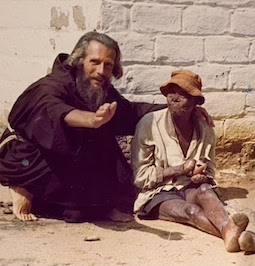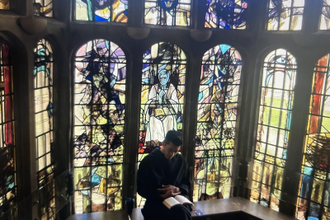Remembering John Bradburne on 44th anniversary of his death

Source: JBMS
Yesterday, 5th September, marked 44 years since John Bradburne was brutally murdered in Zimbabwe trying to get back to the people of Mutemwa who he had cared for, for over ten years.
At the end of August 1979, John told Coletta, a patient at Mutemwa that he was not at peace in his hut, and that 'evil stalked on all sides'. John chose to sleep in the chapel that night and the following day. Sensing something terrible might be about to happen, the patients pleaded with him to leave Mutemwa without delay. John climbed Mount Chigona in the late afternoon and when he reached the top he prayed. John appeared at peace following his descent. He told the patients who had urged him to leave that a great Angel had asked him to stay.
It was too late for John though. The ongoing battles with the farmers over the damage their cattle were causing at Mutemwa had decided together that the white man would be kidnapped and taken to the vakomana where he would 'meet his fate'. The cattle would then be free to roam at will, the people living with leprosy would go away in the absence of his fierce protection, and the land would be handed over to the Kraals. The decision was swift and a pretext for the abduction was quickly devised. The white man was a spy, and his radio was probably a transmitter for sending messages to the Rhodesian army.
At around midnight on Sunday 2nd September,15 kidnappers arrived. They wielded sticks and bazdas, and one of them even carried two hand grenades. The men knocked on the door of John's hut, called him outside and invited him to pray. John rose from his slumber, put on his Franciscan habit and his red headband and opened the door. He told the group he was a ready to pray but that they could do it there on the spot. They told him this was too dangerous for them, insisting they must instead going to the bush. The men dragged John away while he repeated that they could pray wherever they were. The kidnappers then vanished into the night with their hostage, taking with them the radio they had found when they searched the hut.
The mujibhas tied John's hands with a rope. All the while he repeated his mantra that they could pray where they were, asking 'Is this the way you ask me to pray?' John struggled to keep up with his younger kidnappers, stumbling along the way and mumbling that there was no need to travel any further.
After two hours of walking, they arrived at a cave and were greeted by a group of some 40 young mujibhas. They mocked and jostled John, asking him if he had ever eaten shit, and telling him he would soon have the opportunity to do so. John was forced to kneel before being pushed in front of one of the girls whereupon he was told to have sex with her. John neither cried out, nor defended himself in his protestations. The kidnappers played records on a gramophone and shouted at John to dance. He replied that he liked dancing, but would not enjoy it under these circumstances. Having jeered at John all night, his tormenters finally became bored. They tied his hands again and took him to a neighbouring kraal at daybreak.
John was thrown into an empty hut and left there for the day. The mujibhas went to the chiefs and told them they had captured a white man who they could deliver to the vakomana. The committee learned exactly which white man had been abducted and protested that he was a good man who loved the Africans, and who had even been seen carrying a leper on his back to the hospital at Mtoko. The mujibhas were crestfallen by the response and promised to return John to Mutemwa at nightfall.
It became apparent the mujibhas had no intention of following their instructions to take John back to Mutemwe. Instead, they frogmarched a handcuffed John through the bush in search of the vakomana who may be delighted to have the white man delivered to them.
At dawn, the group arrived at Gwaze. This cave was far enough away from Mutemwe for the mujibhas to feel confident John would be unknown to the commander in this region. As they started to climb towards the cave, John fell to his knees. He had seen Christ, who had appeared to him in the form of a native painting of Jesus on the side of the mountain. John prayed before rising again to climb towards the cave with his kidnappers. The cave was in fact empty, and the mujibhas were forced to spend the night there with their captor.
In the late afternoon of 4th September, a guerrilla commander arrived at Gwaze cave with fifteen young men, whose confidence was bolstered by the Kalashinikovs they carried. During preparations for the trial however, the commander met John and realised immediately who he was dealing with. The commander knew that John was the harmless white man from Mutemwa. Among the commander's men was Denford Nyandimu, who had been recruited against his will. Nyandimu knew John personally and offered to act as guarantor for John, explaining how he had looked after the people living with leprosy.
John maintained his silence while the commander asked the mujibhas why they had abducted him. The best excuse they could come up with was the radio transmitter, which they accused John of using to pass information to the Rhodesian army. The commander listened to the mujhabis and received confirmation that the transmitter was no more than an ordinary radio. The commander instructed the mujibhas to return John to Mutemwa so he could continue his work with the people living there.
There was a problem though. John had now seen the hideouts, and the commander's security adjutant said he could not be released. He feared the Smith security men would know how to extract this information from John. It was a risk they could not afford to take. After lengthy discussions they suggested several options which would work as a compromise to keep both John and their hideouts safe. The options for John included traveling to Mozambique or to go to Tanzania. But John was resolute. It was a return to his lepers at Mutemwa or nothing.
Talk of a compromise was over and John was asked what he thought of the liberation of Zimbabwe. John responded by dropping to his knees and reciting both the Lord's Prayer and the Hail Mary.
John joined the commander for a meal where he was told he would be taken by the group to a revolutionary meeting. John sat apparently unnoticed among the crowd. A woman at the revolutionary meeting later reported having sat next to John at one point in the evening. She remembered her twin babies falling asleep on John's lap. When John returned the babies to their mothers' arms, he apparently stood before her saying, 'Amai, you will not see me again but I will pray for you'. The young mother then describes how John dropped to his knees, raised his arms to heaven and recited the 'Our Father' in front of her.
Late into the night of 4th September, the meeting came to an end. The commander instructed John that he was a free man, and that he could return to Mutemwa. Knowing he had a long journey ahead, John set off in the moonlight with a group of villagers who were heading for the road which leads from Mutoko to Nyapamanada. This road also leads to Mozambique. Two guerrillas, armed with Kalashnikovs walked among the group, and other armed guerrillas followed at a distance.
Unnerved by the armed men in their midst, the group eventually arrived at the road about ten miles east of Mutoko. There was a dry stream running close by, and as the villagers made their way across the road, one of the vakomana took John by the arm. He led John into the bed of the stream. Denford Nyandimu, who only hours earlier had vouched for John's good character, later described how the assistant commander approached John and told him, 'Hey, John, you should have gone to Mozambique. Others did, and saved their skin, going back to England'. John fell to his knees as these words were spoken. He then rose to his feet once the assistant commander had finished his speech. A guerrilla standing behind John took this as his cue and emptied his Kalashnikov mercilessly into John's back, killing him.
Despite the cruel and abrupt end to John's life on the 5th of September, we remember him today for the profound care he bestowed upon those at Mutemwa, and for the lasting impact he continues to have from above. His unwavering dedication to the leprosy patients, his selflessness, and his unyielding faith serve as an enduring inspiration to us all. On this day, we honour his memory, reflecting on the legacy of compassion and service he left behind, and the countless lives he touched. John, your spirit lives on in the hearts of many, and we remain grateful for your lasting inspiration he provides.
LINKS
Watch 44th anniversary tributes: www.youtube.com/watch?v=RRzxlRKJ9bg
John Bradburne Memorial Society: www.johnbradburne.com


















